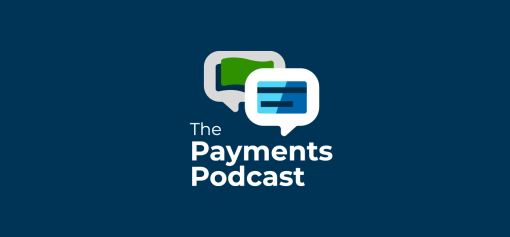Subscribe Today
Richard Ransom, Strategic Customer Success Manager of Bottomline, debunks the topic of Open Banking and its impact on Direct Debits, something that has been a fear around the globe.
The Payments Podcast transcript
Jacqueline Powell: When open banking was introduced, there was a fear that open banking would strike down on direct debits. But a few years on, and the reality couldn’t be more different. I’m Jacqueline Powell, head of corporate communications at Bottomline and to explore this topic, I’m chatting to Richard Ransom, one of our industry leads. Welcome, Richard. Great to have you with us.
Richard Ransom: Thank you.
Jacqueline Powell: So, Richard, while we can’t predict the future, the relationship between the open banking and direct debit world could well change in years to come. But as of today, open banking and direct debit live quite harmoniously helping businesses to collect payments and offering customers options about the way they wish to pay. Firstly, can you share with the audience, what are the key differences between open banking and direct debit?
Richard Ransom: Thank you, Jacqui, yes. And I think if we’re going to answer that question, it’s worth widening it to include credit card as well because that’s becoming a major way that money is collected from individuals and businesses.
So, direct debit is over 50 years old and has high levels of public trust. It’s ubiquitous and it’s still growing. It’s predicted that nine out of ten adults in the UK actually have a direct debit. So, it’s extremely well known, trusted and widely used. And direct debit enables money to be pulled from a bank account with the payer’s permission which is in the form of what is known as a DDI or mandate.
And, as you’ll know, if you’ve got a direct debit, notice has to be given of the first collection which is about 10 days. And failures and changes such as a bank account changing or not having enough money in the account are managed by the biller, the person who’s collecting money from you. This is all done through a set of messages and a well-automated process.
Open banking is relatively new. It’s only been with us for the last few years. It started to gain traction as a one-off collection mechanism for things like tax payments with the HMRC. And in fact, there are over 5 million active users of open banking in the UK today. So that’s quite a high number. And a recent announcement says that the government are going to provide more and more services where you can pay using open banking.
Subscription type payments are in their infancy. But something called variable recurring payments is coming in the next 18 months and it’s likely to shake things up. In open banking, the payer gives a third party permission, including an authentication with the payer’s bank, that the third party can initiate a payment to the biller on their behalf.
So, in effect, money would be pushed from my account to the biller’s account by a third party but using my permission. And that’s all authenticated with the bank, so it’s a safe and secure process. But that’s a push rather than a pull from my account. And, as I said, we’ll talk about credit card as well.
Credit card is also really mature like direct debit. And it’s ubiquitous and most people have a card. But regular collections using credit card didn’t used to be particularly popular. And larger billers would typically prefer DD as a first collection, but not as a regular collection type.
And several reasons for this. There wasn’t a lot of trust and lots of mouths to feed in the process if you are the biller. So, there are lots of people in the process who want a chunk of the money that you’re collecting. However, in recent times, the growth of subscription economy has seen many hugely popular services such as Amazon Prime, Netflix, Disney+ etc., only offering credit card in the UK as a collection type. So that makes for an interesting dynamic as we move forward into the new world of open banking, as DD matures, but as different types of subscription economy grow.
Jacqueline Powell: Indeed it does. So, thanks for covering those differences, Richard. That’s really interesting. Moving on to customer protection then, how do you believe your services compare?
Richard Ransom: Yes, this is another really interesting point and up for a lot of debate at the moment. So, direct debit is and has always been protected by a guarantee and that gives the payer rights to full immediate refund in the event of an issue. And this indemnity is not timebound. So, if I had a problem with a direct debit seven years ago and I only just noticed and it’s legitimate, then I can go to my bank, the bank will refund the money that I am owed and then, in the background, the bank will seek to take the money back off the biller.
So, this immediate unlimited guarantee is one of the very strong points of direct debit. It’s not without its issues. And I think for things like business-to-business direct debit, it may actually be more of a hurdle to acceptance by biller than an advantage.
Credit card is protected by a chargeback mechanism where refund can be obtained from the card company if there is an issue. So, if you buy goods or services that aren’t what you expected or don’t happen as you expected, you can get a refund from them.
So, these are clear consumer protections. Open banking is less clear today. And it may be stopping some billers and consumers from using the service. It’s a lot more difficult and a lot more opaque in terms of getting your money returned if you think a payment has been authorised from your account that you didn’t want to happen.
Jacqueline Powell: So, from what I’m hearing then, there is a lot of overlap between these services. Or open banking and direct debit, in that case, is it an either/or scenario? Or do you think there is a practical hybrid model even emerging?
Richard Ransom: So, yes, we can see hybrid models emerging. And there are some already today which pair credit card for first collection and a normal collection under direct debit. But direct debit very much suits regular scheduled collections with little variation in amounts. So, insurance, utilities, council tax, etc. The time between set-up and first collection means that often other payment methods are used for the first collection like card. Or increasingly one-off payment by open banking.
In terms of a regular subscription, open banking and variable recurring payments when it arrives suits much more flexible arrangements in terms of value and date and gives immediate access to funds. So, this would suit retail applications. And where a credit card may have been used in the past for these use cases, open banking presents a lower cost option given that the payment is sent from one account to another rather than through a third-party acquiring bank which is part of the credit card process.
And I think a significant proportion of direct debit is used to today for payments outside of regular scheduled model. And this is where we see open banking and VRP taking DD volumes.
So, for the majority of direct debit, variable recurring payments doesn’t really offer a… It offers a different way of doing things, but there’s no definite advantage. However, no, there are those cases where when it’s an irregular amount or date, then open banking will suit that a lot more.
So, the other dynamic in play, especially if we look at the financial inclusivity and the gig economy, when there isn’t necessary a monthly lump sum pay day, it’s for the biller to provide an alternative where DD isn’t suitable or is problematic today. And this is where open banking can fit especially if used alongside a service like request to pay which was recently launched, where the biller can have a dialogue about a bill, where they may need to defer the payment or reduce the payment or not pay. So, it’s an entirely different way of managing that subscription.
Jacqueline Powell: Thank you for that useful information, Richard. It’s been great to learn how it need not be an either/or choice for businesses, but more of a real opportunity to offer customers choice. So, while open banking may not change how people pay their council tax yet, it could alter the way organisations manage larger less frequent payments over a set period of time. And it’s worth certainly watching this space.
As we close out, Richard, I have one last question for you. If a business wanted to exploit the opportunity of open banking, how do they actually go about doing that and what does that look like?
Richard Ransom: That’s a good question. So, with direct debit, there’s a fair bit of work to do as a biller and the bank has to ultimately give you sponsorship, so it’s not suitable for all types of organisation and the bank will have various parameters per bank on whether or not they’ll let you collect money in that way.
Open banking is different because of the direction of the payment. So, with open banking rather than the biller pulling the payment from a file, the biller is actually pushing the payment from the payer’s account into their own bank account.
Now to be able to do that, the biller needs the help of a regulated third party. So, security, regulations, all around this. So, the FCA regulate organisations to use open banking. They’re regulated for one, two or both of those things. So, payment initiation, and that’s the one where you’re allowed to payments out of a payer’s account into your account through a third party, and account information where the biller can have a look at the balance of your account basically or transactions within it. And that might help with things like just verifying who you are or looking at your spend patterns.
But for this conversation, we’re only talking about the payment part of it. So, if you want to offer open banking, you need to find a provider who is regulated and they’re on the open banking website. There’s clearly lists of people who are regulated.
They will be the ones that will help to build a journey so that you can offer a payment type so that in your website, for example, someone can ask to pay for a bill by open banking. And in that well thought out and planned user journey that’s been put together by open banking, you’ll then get to authenticate with your bank and you’ll actually connect to your bank as part of that process and authenticate through your mobile device or your eBanking to allow that payment to take place.
And you can stop that at anytime if you’re the payer. So, from a biller’s point of view, it’s a simpler process because there’s a third party in there as well who is actually doing that financial transaction piece.
Jacqueline Powell: Pretty much sounds like a win-win to me. All that’s left is for me to say thank you for this educational update, Richard. I really appreciate your time.
Richard Ransom: No problem at all.
Jacqueline Powell: Now if you’d like to find out more about direct debits, open banking or using the PTX payment platform for getting money into your business then give our team a shout or visit our website: www.bottomline.com. And for now, it’s thanks to Richard for joining us and goodbye. Until next time.
END AUDIO


